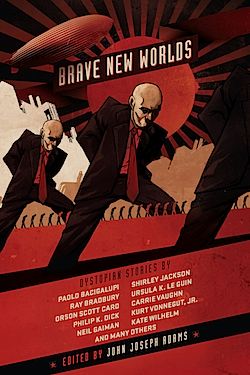The roots of the word dystopia—dys- and -topia—are from the Ancient Greek for “bad” and “place,” and so we use the term to describe an unfavorable society in which to live. “Dystopia” is not a synonym for “post-apocalyptic”; it also is not a synonym for a bleak, or darkly imagined future. In a dystopian story, society itself is typically the antagonist; it is society that is actively working against the protagonist’s aims and desires. This oppression frequently is enacted by a totalitarian or authoritarian government, resulting in the loss of civil liberties and untenable living conditions, caused by any number of circumstances, such as world overpopulation, laws controlling a person’s sexual or reproductive freedom, and living under constant surveillance.
Whether or not a society is perceived as a dystopia is usually determined by one’s point of view; what one person may consider to be a horrible dystopia, another may find completely acceptable or even nigh-utopian. For instance, if you don’t care about procreating, then living in a world in which the birth rate is strictly regulated wouldn’t seem very dystopic to you; to someone who values that very much, however, having society tell you how, when (or how often) you can procreate would seem like something out of a nightmare. Or a person who doesn’t enjoy reading or intellectual thinking might not care if books are banned… or even hunted down and destroyed, as in Fahrenheit 451, whereas you, dear reader, would probably care very much.
Many societies in fiction are depicted as utopias when in fact they are dystopias; like angels and demons, the two are sides of the same coin. This seemingly paradoxical situation can arise because, in a dystopia, the society often gives up A in exchange for B, but the benefit of B blinds the society to the loss of A; it is often not until many years later that the loss of A is truly felt, and the citizens come to realize that the world they once thought acceptable (or even ideal) is not the world they thought it was. That’s part of what is so compelling—and insidious—about dystopian fiction: the idea that you could be living in a dystopia and not even know it.
Dystopias are often seen as “cautionary tales,” but the best dystopias are not didactic screeds, and the best dystopias do not draw their power from whatever political/societal point they might be making; the best dystopias speak to the deeper meanings of what it is to be one small part of a teeming civilization… and of what it is to be human.
Nineteen Eighty-Four, Fahrenheit 451, and Brave New World are the cornerstones of dystopian literature in novel form, but there has never, to my knowledge, been an anthology collecting all the best, classic works of dystopian short fiction in one volume. My recent anthology Brave New Worlds aims to do exactly that, spanning from 1948 to the present day, from what is perhaps the classic dystopian short story—“The Lottery” by Shirley Jackson—to stories just published in the last two years but which will surely stand the test of time.
And so Brave New Worlds offers thirty-three such stories, representing the best of what dystopian fiction has to offer. For more information about the book and dystopias, you can visit the anthology’s website, where you’ll find the complete text of nine of the stories, as well as interviews with the authors and other items of interest to those interested in dystopian literature.
John Joseph Adams is the bestselling editor of many anthologies, such as Wastelands, The Living Dead (a World Fantasy Award finalist), By Blood We Live, Federations, and The Improbable Adventures of Sherlock Holmes. Barnes & Noble.com named him “the reigning king of the anthology world,” and his books have been named to numerous best of the year lists. His latest books are Brave New Worlds, The Living Dead 2 and The Way of the Wizard. He is also the editor of Fantasy Magazine and Lightspeed Magazine, and is the co-host of The Geek’s Guide to the Galaxy podcast. Find him on Twitter @johnjosephadams.










